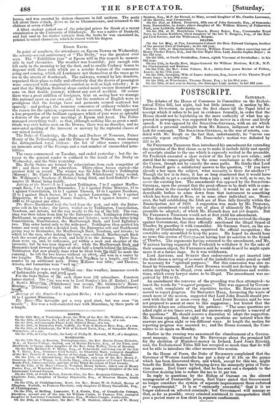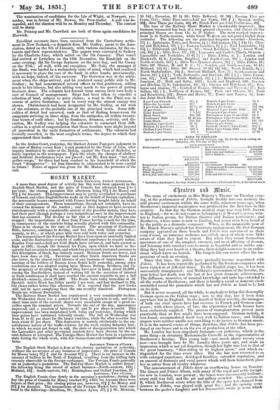POSTSCRIPT.
SATURDAY.
The debates of the House of Commons in Committee on the Ecclesi- astical Titles Bill, last night, had but little interest. A motion by Mr. The debates of the House of Commons in Committee on the Ecclesi- astical Titles Bill, last night, had but little interest. A motion by Mr.
THOMAS DUNCOMBE, to postpone the first clause till the Papal brief or
rescript which it refers to be put in evidence formally, in order that the- House should not be legislating on the mere authority of what has ap- peared in newspapers, was supported by the mover in a clever and lively speech. It was opposed by the Somerron-GENERAL, with an air which Provoked a personal onslaught from Mr. KEOGH, indignant at what he took for contempt. The SOLICITOR-GENERAL, in the war of retorts, con- doled with Mr. Keogh on the fact that, unfortunately, ho "never can correctly repeat anything." Mr. Duncombe's motion was defeated by 231 to 49.
Sir FREDERICK MESMER then introduced his amendment for extending the operation of the first clause so as to make it include fairly and openly-
all rescripts similar to the one which is expressly recited in the preamble.
Sir Frederick executed a clear review of the laW as it now exists ; and, stated that he comes generally to the same conclusions as the officers of
the Crown though not by exactly the same paths. He thinks that lord John Russell gave a satisfactory answer to the question, "If you have already a law upon the subject, what necessity is there for another ?"
Though the law is in force, it has so long slumbered that it would have- been difficult to get a conviction from a jury ; and it is well, so to say, to- revive the existing law. The amendment was opposed by the SOLICITOR- GENERAL, upon the ground that the great offence to be dealt with is com- mitted alone in the rescript which is recited : it would be an act of in- describable bathos to come down from that instrument to something-
which has been done at Ross, or in some other individual see. More- over, the bull establishing the Irish see of Ross falls literally within the- Emancipation Act of 1829. A suggestion was made by Mr. Diskaarr, that the amendment would be out of place if ultimately Mr. Walpole's preamble be adopted ; of which Mr. Disraeli does not yet despair. But. Sir FREDERICK THESIGER would not at first yield his amendment
- The discussion then became desultory. Mr. NAPIER revived the charge against Government, that they officially sanctioned the illegal Synod of Thurles, by guarding it with constables. Sir GEORGE GREY, on the au- thority of Constabulary reports, negatived the official recognition ; the constables only assembled to keep the peace. He hoped he should hear
no more this session of Government having lent its sanction to the Synod of Thurlesr, The -arguments having returned to the amendment, and Mr.. IV.L.--roLE having requested Sir Frederick to withdraw it for the sake or their common object, Sir FREDERICK said he would do so if he might again move it at a future stage. So it was withdrawn.
Lord ARUNDEL and SURREY then endeavoured to get inserted into the first clause a saving of so much of the jurisdiction made penal as shall' be necessary for "spiritual purposes." But this concession was also re. fused by Government. Lord JOHN RUSSELL would not declare by impli- cation anything to be illegal, even under certain limitations and restric- tions, which every lawyer states to be illegal. The amendment was ne- gatived by 316 to 61. An amendment the converse of the preceding was then attempted—to insert the words for "temporal purposes." This was opposed by Govern- ment, with complaints of the repetitive tactics. Mr. REYNOLDS now moved to report progress. Sir BENJAMIN HALL, foreseeing the waste of much more of the session, suggested that Lord John Russell should pro- ceed with the bill at noon every day. Lord JOHN RUSSELL said he was not prepared to assent at once to this suggestion ; but hinted that the iterative delays are exhausting his patience : " The same questions are asked eight or ten times over, and the answers only provoke a renewal of the questions." He should reserve a discretion to adopt the suggestion. Mr. MOORE rejoined, that eight or ten questions are natural when the answers are given eight or ten different ways. At length the motion for reporting progress was assented to ; and the House resumed, the Com- mittee to sit again on Monday.
Earlier in the evening was announced the abandonment of a Govern- ment measure. Questioned by Mr. REYNOLDS about the promised bill for the abolition of Ministers-money in. Ireland, Lord Jour{ RUSSELL said, the Ecclesiastical Titles Bill has occupied so much time that he will not be able to introduce the other measure this session.
In the House of Peers the Duke of RICHMOND complained That the Governor of Western Auslralia has put a duty of 2/. 10s. on the guano which has been discovered there, and which, except for this tax, might benefit the British farmer by bringing down the monopoly price of Peru- vian guano. Earl GREY replied, that he has sent out a despatch to the Governor desiring him to reduce the tax. to U. per ton. In reply to questions by the Bishop. of OXFORD on the altered management of l'entonville prison, Earl GREY stated that Government no longer considers the system of separat6 imprisonment there enforced as " experimental." It is so " eminently successful," that it is no longer enforced on selected criminals • but Government will manage so that, as far as possible every criminal sentenced, to transportation shall pass a period more or less short in separate confinement.
The nomination of candidates for the Isle of Wight, at Newport, yes- terday, was in favour of Mr. Dawes, the Free-trader. A poll was de- manded, and the election will be on Monday and Thursday. The contest will be sharp.
Mr. Prinsep and Mr. Crawford are both of them again candidates for Harwich.



























 Previous page
Previous page